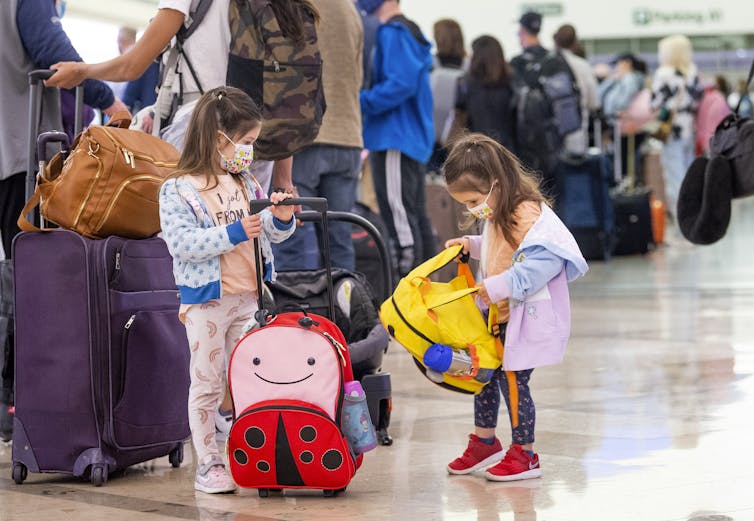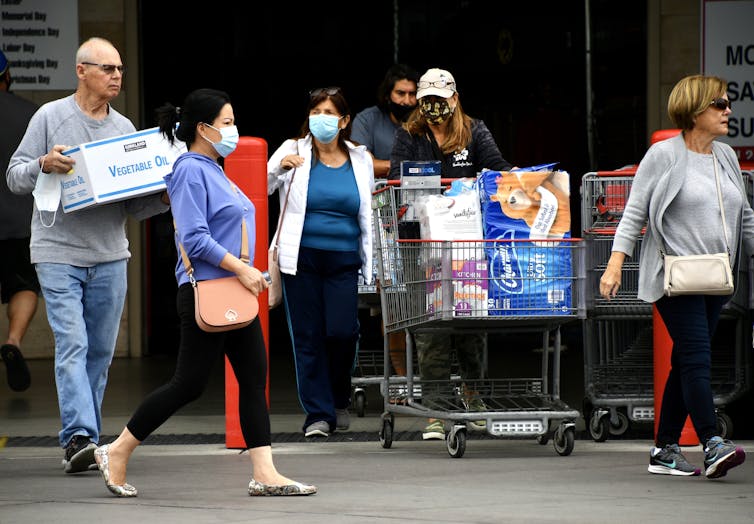Peter Chin-Hong, University of California, San Francisco
Vaccinated people need to mask up again, according to the U.S. Centers for Disease Control and Prevention. On July 27, 2021, the CDC recommended that everyone in areas with high COVID-19 infection rates wear masks in public indoor spaces, regardless of vaccination status.
It’s a reversal from the CDC’s May 2021 advice that the fully vaccinated could leave their masks at home and brought U.S. guidelines more in line with World Health Organization recommendations.
The Conversation asked Peter Chin-Hong, a physician who specializes in infectious diseases at the University of California, San Francisco, to help put into context the science behind the changing messages.
What science supports masking after vaccination?
Masks help stop the spread of the coronavirus. They’re a literal layer between you and any virus in the air and can help prevent infection.
The reason public health officials are calling for more mask-wearing is that there is clear and mounting evidence that – though rare – breakthrough COVID-19 infections can occur in people who are fully vaccinated. This is particularly true with emerging variants of concern. The good news is that COVID-19 infection, if it does happen, is much less likely to lead to serious illness or death in vaccinated people.
Some conditions make a breakthrough infection more likely in a vaccinated person: more virus circulating in the community, lower vaccination rates and more highly transmissible variants.
If vaccinated people can get infected with the coronavirus, they can also spread it. Hence the CDC recommendation that vaccinated people remain masked in indoor public spaces to help stop viral transmission.
Where will the guidelines apply?
The CDC mask recommendation targets areas in the U.S. with more than 50 new infections per 100,000 residents or that had more than 8% of tests come back positive during the previous week. By the CDC’s own definitions “substantial” community transmission is 50 to 99 cases of infection per 100,000 people per week, and “high” is 100 or more.
Los Angeles County, for example, far surpassed that mark in mid-July, with more than 10,000 coronavirus cases per week.
Using these criteria, the CDC guidance applied to 63% of U.S. counties on the day it was announced.

Who’s actually protected by masking recommendations?
The recommendation that fully vaccinated people continue wearing masks is primarily intended to protect the unvaccinated – which includes kids under age 12 who are not yet eligible for vaccines in the U.S. The CDC further recommends masking in public for vaccinated people with unvaccinated household members, regardless of local community transmission rates.
Unvaccinated people are at a substantially higher risk of getting infected with and transmitting SARS-CoV-2, and of developing complications from COVID-19.
How do new variants like delta change things?
Preliminary data suggests that the rise of variants like delta may increase the chance of breakthrough infections in people who received only their first vaccine dose. For instance, one study found that a single dose of the Pfizer vaccine had an effectiveness of just 34% against the delta variant, compared with 51% against the older alpha variant in terms of warding off symptomatic disease.
The data is more reassuring for those who have been fully vaccinated. After two doses, the Pfizer vaccine still provides strong protection against the delta variant, according to real-world data from Scotland and a variety of other countries; and in preliminary studies out of Canada and England, researchers noted only a “modest” decrease in effectiveness against symptomatic disease, from 93% for the alpha variant to 88% for delta.
Other recent preliminary reports from highly vaccinated countries like Israel and Singapore are sobering, however. Before the delta variant became widespread, from January to April 2021, Israel reported that the Pfizer vaccine was 97% effective in preventing symptomatic disease. Since June 20, 2021, with the delta variant circulating more widely, the Pfizer vaccine has been only 41% effective in preventing symptomatic disease, according to preliminary data reported by Israel’s Ministry of Health in late July. An analysis using government data from Singapore demonstrated that 75% of recent COVID-19 infections were in people who were at least partially vaccinated – though most of them were not severely ill.

In all reports and studies, however, vaccines remain very good at preventing hospitalizations and severe disease due to the delta variant – arguably the outcomes we most care about.
All of this emerging data supports the WHO’s global recommendation that even fully vaccinated individuals continue to wear masks. Most of the world still has low vaccination rates and uses a range of vaccines with variable efficacies, and countries have different burdens of circulating SARS-CoV-2 virus.
With U.S. case counts and breakthrough infection numbers headed in what public health officials consider the wrong direction, it makes sense that the CDC would modify its masking recommendations to be more conservative.
What conditions in the US warrant masking up (again)?
It makes sense that the CDC didn’t immediately change its recommendations to fall in line with the WHO’s June guidelines. With an overall high countrywide vaccination rate and a low overall COVID-19 hospitalization and death burden, the U.S. has a COVID-19 landscape very different from that in most of the world.
Additionally, some experts worried that an official message that the vaccinated should don masks might dissuade unvaccinated individuals from seeking vaccines.
But as President Joe Biden put it on July 27, “new research and concerns about the delta variant” are behind the CDC’s change in masking recommendations.
Some locations are seeing further increase in community transmission, even among vaccinated people. New preliminary research yet to be peer reviewed suggests the delta variant is associated with a viral load a thousand times higher in patients than seen with older strains. And early reports show infected vaccinated people with the delta variant can carry just as high an amount of virus as the unvaccinated that they can in turn spread to others.
The shifting recommendations don’t mean that the old ones were wrong, necessarily, only that conditions have changed. The bottom line? Masks do help cut down on coronavirus transmission, but it’s still vaccines that offer the best protection.
This is an updated version of an article originally published on July 22, 2021.
Peter Chin-Hong, Associate Dean for Regional Campuses, University of California, San Francisco
This article is republished from The Conversation under a Creative Commons license. Read the original article.







